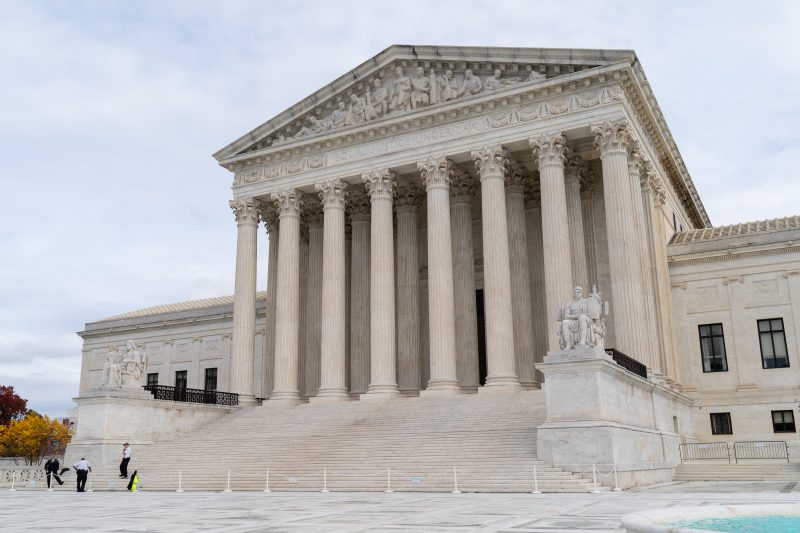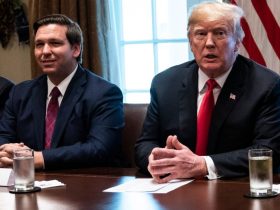A Virginia jail broadcasts Christian services on televisions throughout the facility every Sunday. Six years ago, a man detained at the facility sued, saying the practice violated his rights as a Sunni Muslim. But an appellate court says it cannot rule on whether showing the programs is constitutional, because the U.S. Supreme Court has changed the way it interprets government establishment of religion.
Middle River Regional Jail in Staunton, Va., on Sundays plays on televisions in every common area a video donated by a local Mennonite Christian group, according to the court record. David Nighthorse Firewalker-Fields complained in 2017, saying he should not be forced to listen to Christian services; he was told that he could avoid the broadcast by staying in his cell. He lost at district court in 2019 and appealed.
Judges on the U.S. Court of Appeals for the 4th Circuit say that until last year, they would have applied the “Lemon test,” based on a 1971 decision that said the First Amendment prohibited government’s subsidizing of parochial schools. They would have looked at whether the policy had secular goals and effects and whether it would lead to government “entanglement” with religion or appear to be endorsement of one belief system.
“But … the Supreme Court upended that approach” with its ruling in favor of a high school football coach who led postgame prayers on the field, a three-judge panel said this week. “In its place,” the judges said, “courts should use an analysis that focuses on history, tradition, and original meaning.”
The unanimous decision was written by Judge Julius N. Richardson, nominated by President Donald Trump, and joined by Chief Judge Roger L. Gregory, first nominated by President Bill Clinton, and Judge Rossie Alston, nominated by Trump to the U.S. District Court for the Eastern District of Virginia. (District judges occasionally sit on appellate panels.)
The relevant Supreme Court decision from last year in the case from Washington state was joined by all six justices nominated by Republican presidents and was opposed by the three nominated by Democratic presidents. It was one of several recent decisions in which the Supreme Court decreed that laws must be evaluated within the “original meaning and history” of the Constitution. In dissent, Justice Sonia Sotomayor wrote that there was no “meaningful explanation” of this “history-and-tradition test.”
Richardson said that the new test was “unsettled” but that the Supreme Court had given “some guidance” in past decisions upholding legislative prayers, display of a cross on government land and Sunday closing laws.
Lawyers for Firewalker-Fields asserted in a court filing that the jail policy was unconstitutional under the new standard — that the Constitution’s authors were concerned about “coercive attendance at religious exercises” imposed by the British, similar to broadcasting a Christian service throughout a jail.
The jail argued that there was no such coercion, because there was “no evidence to demonstrate [Firewalker-Fields] lost any tangible benefit by choosing to remain in his cell during the service.”
The appellate court declined to weigh in, saying the historical analysis should be attempted first by the district court that first heard the case.
The author of a book about religion in American public life said it is impossible to say what the Constitution’s framers had in mind when they wrote the First Amendment, because it was a compromise between those who wanted strict separation of church and state and those who wanted to protect state endorsement of Protestant Christianity.
“What they agreed on was language that was itself ambiguous,” David Sehat said. “From a historical perspective, there’s no real way of saying who was right. They disagreed before and after the amendment.”
This particular question would be impossible to place in an 18th-century context, Sehat said — there were no penitentiaries at the time the First Amendment was drafted.
“Historians are pretty skeptical of this move to history and tradition, because the courts and judges and lawyers in general are bad historians and they have a very narrow view,” he said.
In its 2022 decision on football game prayers, the Supreme Court said it had “long ago abandoned Lemon.” The court had already paved the way for state funding of religious schools in another 2022 case involving a Maine voucher program. But the test was applied in the 4th Circuit as recently as 2020, when a district judge used it to reject a challenge to a high school reading curriculum.
The Lemon test is now “finally dead,” Richardson wrote. “… It is now clear that Lemon and its ilk are not good law.”
Firewalker-Fields was transferred from the jail to prison after only a few months. But the fight over the constitutionality of the Christian broadcasts — and of religion in government generally — will continue in the lower federal court.








